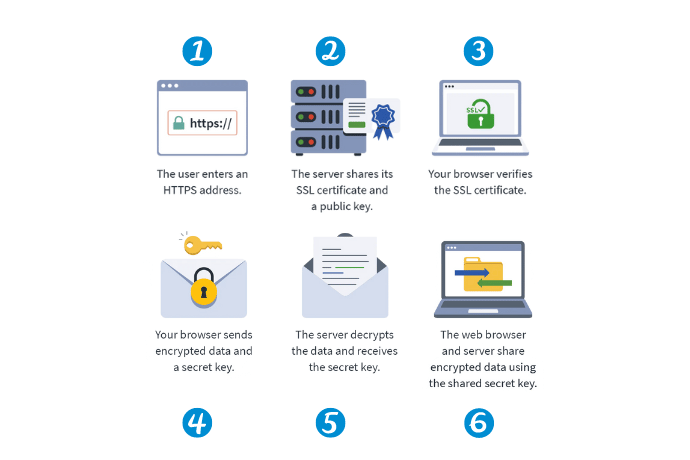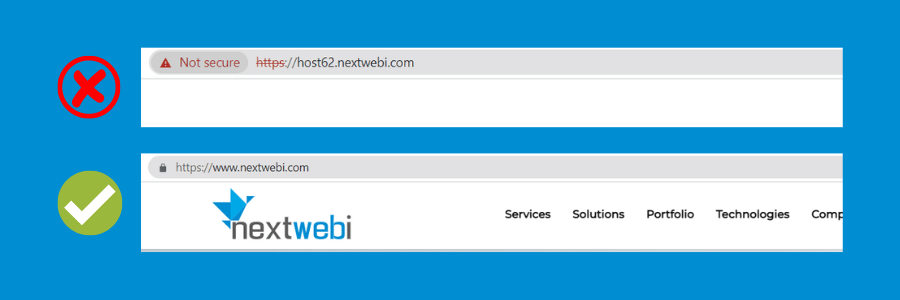In today's world, online security is more important than ever. With the increasing number of cyber attacks, it's crucial for websites to protect their users' sensitive information. That's where SSL certificates come in
In this blog, we will cover everything you need to know about SSL certificates, including what they are, how they work, and why they are important. We'll also dive into the different types of SSL certificates available, how to check if your website has an SSL certificate, and how to choose the right one for your needs.
Not only that, but we'll also guide you through the process of installing an SSL certificate on your website. We'll cover the steps you need to take, from purchasing the certificate to configuring your server, to ensure that your website is secure.
So, whether you're a website owner, developer, or just someone interested in online security, read on to learn all about SSL certificates and how they can protect your website and your users.
What is an SSL Certificate?
An SSL certificate is a digital certificate that provides encryption and authentication for websites. It enables secure communication between a website and its users by encrypting all the data transmitted between them. SSL certificates are typically used to secure online transactions, such as e-commerce sites, where users enter their personal and financial information.
When a website has an SSL certificate installed, it allows the website to use the HTTPS protocol instead of HTTP. The “S” in HTTPS stands for “secure,” which is an indication to users that the site is protected by encryption. Browsers also display a padlock icon in the address bar, letting visitors know that the site is secure.
How SSL Certificates Work

When a user visits a website with an SSL certificate, the browser establishes a secure connection with the website's server. The SSL certificate then verifies the identity of the website and encrypts all data transmitted between the user's browser and the website's server.
Here’s how the process works:
-
The user enters an HTTPS address.
-
The server shares its SSL certificate and a public key.
-
Your browser verifies the SSL Certificate.
-
Your browser sends encrypted data and a secret key.
-
The server decrypts the data and receives the secret key.
-
The web browser and server share encrypted data using the shared secret key.
Advantages of SSL Certificates

-
Increased security: SSL certificates protect sensitive information, such as passwords, credit card numbers, and other personal data from being intercepted by hackers. This added security helps to prevent identity theft and fraud.
-
Better search engine ranking: Search engines like Google give preference to websites that have SSL certificates installed. This is because secure sites are seen as being more trustworthy, which can lead to higher search engine rankings and more traffic.
-
Improved user experience: When a user visits a website with an SSL certificate, they are assured that their personal information is safe. This can lead to increased trust and confidence in the website, which can result in better customer satisfaction and higher conversion rates.
-
Compliance with industry regulations: Some industries, such as finance and healthcare, are required to comply with strict regulations regarding the handling of personal data. Installing an SSL certificate can help websites meet these regulations and avoid costly fines.
Different Types of SSL Certificates
-
Domain Validated (DV) SSL Certificates: This type of certificate is the most basic and the least expensive. It verifies that the domain name is registered to the person or organization who is requesting the certificate.
-
Organization Validated (OV) SSL Certificates: This type of certificate provides more information about the organization than a DV certificate. It includes the organization's name, address, and country.
-
Extended Validation (EV) SSL Certificates: This type of certificate provides the highest level of authentication. It requires the most thorough vetting process and provides the green address bar in the browser, which is a visual indicator that the website is secure.
-
Wildcard SSL Certificates: This type of certificate secures not only the main domain but also any subdomains associated with it. This makes it an ideal solution for websites with multiple subdomains.
-
Multi-Domain (SAN) SSL Certificates: This type of certificate allows website owners to secure multiple domain names with a single certificate.
How to Choose the Right SSL Certificate
With so many different types of SSL certificates available, it can be difficult to know which one is right for your website. Here are some factors to consider when choosing an SSL certificate:
-
Purpose of the website: What type of information will be transmitted through the website? If it is sensitive information such as personal data or financial information, an EV SSL certificate may be the best choice.
-
Number of domains: Will you need to secure multiple domains with a single certificate? If so, a Wildcard or Multi-Domain SSL certificate may be a good option.
-
Budget: SSL certificates can vary greatly in price, so it is important to consider your budget when making a decision.
-
Customer trust: A well-known brand and a high level of customer trust can be a deciding factor in choosing an OV or EV SSL certificate.
How can I tell if my website has SSL?
To check if a website has an SSL certificate, look at the address bar in your browser. If the website uses HTTPS, it has an SSL certificate installed. You can also look for the padlock icon in the address bar, which indicates a secure connection.

In addition, you can use online SSL checkers, such as SSL Labs, to verify the SSL certificate on a website. These tools will provide information about the certificate, including its validity, issuer, and encryption strength.
How to Install an SSL Certificate on your Website
Installing an SSL certificate can seem daunting, but with the right tools and some technical knowledge, it can be a straightforward process. Here are the steps to install an SSL certificate:
-
Purchase an SSL certificate: Choose a certificate authority and purchase an SSL certificate.
-
Generate a CSR (Certificate Signing Request): This is a file that contains information about the website, including the domain name and the organization’s contact information.
-
Verify domain ownership: The certificate authority will verify that the domain name is registered to the person or organization who is requesting the certificate.
-
Install the certificate: Once the certificate authority has verified the information, they will issue the certificate, which can then be installed on the website's server.
-
Configure the server: The server must be configured to use the SSL certificate and the HTTPS protocol.
-
Test the installation: Once the certificate is installed, it is important to test the website to make sure that it is working correctly.
Conclusion
In conclusion, SSL certificates are essential for the security and protection of a website and its users. They provide encryption and authentication to secure online transactions and personal data. With the increasing number of cyber threats, it is essential for website owners to install an SSL certificate to protect their customers' information and ensure the security of their online presence.